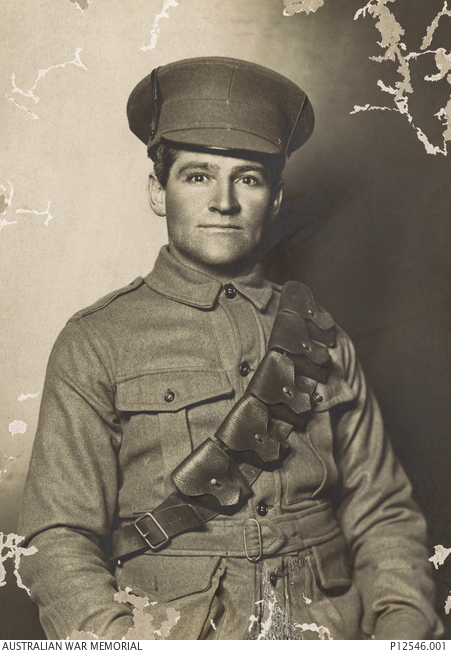Dvr
Alexander McKernan
Information about birth
|
Year of birth: 1885 |
|
Place of birth: Euroa, Strathbogie, Victoria, Australia |
General information
|
Last known residence: Euroa, Strathbogie, Victoria, Australia |
|
Profession: Farmer |
|
Religion: Church of England |
Army information
|
Country: Australia |
|
Force: Australian Imperial Force |
|
Rank: Driver |
|
Service number: 136A |
|
Enlistment date: 07/01/1915 |
|
Enlistment place: Strathbogie, Victoria, Australia |
|
Units: — 3rd Field Ambulance (Last known unit) |
Information about death
|
Date of death: 31/10/1917 |
|
Cause of death: Killed in action (K.I.A.) |
|
Age: 32 |
Cemetery
|
Potijze Chateau Grounds Cemetery Plot: I Row: C Grave: 6 |
Distinctions and medals 3
|
1914-15 Star Medal |
|
British War Medal Medal |
|
Victory Medal Medal |
Points of interest 4
| #1 | Place of birth | ||
| #2 | Last known residence | ||
| #3 | Enlistment place | ||
| #4 | Place of death (approximate) |
My story
Alexander McKernan, a former farmer, was born in April 1885 in Euroa, Strathbogie, Victoria, Australia. He was the son of John and Matilda McKernan, and the brother of Annie McKernan. On January 7, 1915 he enlisted in Strathbogie, Victoria. He joined the 1st Australian General Hospital. Later, he joined the 3rd Field Ambulance (Australian Army Medical Corps) with the rank of Driver, part of the 1st Australian Division.
This company is primarily known for being the company John Simpson Kirkpatrick was registered in (John Simpson became Australia's most famous military hero for his innovative idea of using a donkey to assist in carrying wounded soldiers from the high ground of the front line, back to the dressing stations located at Anzac Cove).
Before coming to the front in Flanders and France, he was active in Alexandria and Greece (in 1915 and 1916). In January 1917, he was admitted tot the hospital in France. During his furlough in England in May 1917, he was also admitted to the hospital. He rejoined his unit on June 29, 1917.
In October 1917, the 3rd Australian Field Ambulance was admitted at Wippenhoek Rest Station, near Poperinge. According to his files, on October 31, 1917 around 15h30 Sergeant Naylor had sent Driver McKernan, mounted on a horse with a small parcel to be handed to a member of the ambulance at the wagon loading post at Cordial Factory R.A.P., after which he never returned. Private J. G. Pearson reported the Alexander McKernan handed him the packet around 16h00 and he then galloped back along the road, which was heavily shelled at the time. When Pearson returned two hours later, he noticed numerous dead horses and men along the road.
Alexander, aged 31, was killed in action on October 31, 1917, after he was first reported missing. Private Grubb and Private Morley were returning to R.A.P. (Regimental Aid Post), near Railway Crossing at the Zonnebeke Road. They picked up an Australian pay book, which belonged to Alexander. 3 or 4 days later, Alexander was buried close to where he fell, by Canadian soldiers. After the war, his remains were exhumed and reinterred at Potijze Chateau Grounds Cemetery, Plot I, Row C, Grave 6.
This company is primarily known for being the company John Simpson Kirkpatrick was registered in (John Simpson became Australia's most famous military hero for his innovative idea of using a donkey to assist in carrying wounded soldiers from the high ground of the front line, back to the dressing stations located at Anzac Cove).
Before coming to the front in Flanders and France, he was active in Alexandria and Greece (in 1915 and 1916). In January 1917, he was admitted tot the hospital in France. During his furlough in England in May 1917, he was also admitted to the hospital. He rejoined his unit on June 29, 1917.
In October 1917, the 3rd Australian Field Ambulance was admitted at Wippenhoek Rest Station, near Poperinge. According to his files, on October 31, 1917 around 15h30 Sergeant Naylor had sent Driver McKernan, mounted on a horse with a small parcel to be handed to a member of the ambulance at the wagon loading post at Cordial Factory R.A.P., after which he never returned. Private J. G. Pearson reported the Alexander McKernan handed him the packet around 16h00 and he then galloped back along the road, which was heavily shelled at the time. When Pearson returned two hours later, he noticed numerous dead horses and men along the road.
Alexander, aged 31, was killed in action on October 31, 1917, after he was first reported missing. Private Grubb and Private Morley were returning to R.A.P. (Regimental Aid Post), near Railway Crossing at the Zonnebeke Road. They picked up an Australian pay book, which belonged to Alexander. 3 or 4 days later, Alexander was buried close to where he fell, by Canadian soldiers. After the war, his remains were exhumed and reinterred at Potijze Chateau Grounds Cemetery, Plot I, Row C, Grave 6.
Sources 5
|
3rd Australian Field Ambulance (Australian War Memorial, Campbell (AWM), AWM4). https://www.awm.gov.au/ Sources used |
|
Australian Red Cross Wounded and Missing Enquiry Bureau (Australian War Memorial, Campbell (AWM),1DRL/0428). https://www.awm.gov.au/ Sources used |
|
First Australian Imperial Force Personnel Dossiers, 1914-1920 (National Archives of Australia, Canberra (NAA), B2455). https://www.naa.gov.au/ Sources used |
|
National Archives of Australia http://recordsearch.naa.gov.au/SearchNRetrieve/Interface/SearchScreens/BasicSearch.aspx Sources used |
|
Unit embarkation nominal rolls, 1914-18 War (Australian War Memorial, Campbell (AWM), AWM8). https://www.awm.gov.au/ Sources used |
More information 5
|
Commonwealth War Graves Commission Database https://www.cwgc.org/find-records/find-war-dead/casualty-details/158487 |
|
Namenlijst (In Flanders Fields Museum) https://namenlijst.org/publicsearch/#/person/_id=c68ec6fc-700e-41d9-b894-7f66c3916472 |
|
The AIF Project (UNSW Canberra) https://aif.adfa.edu.au/showPerson?pid=201204 |
|
The AIF Project (UNSW Canberra) https://aif.adfa.edu.au/showPerson?pid=201205 |
|
Lives of the First World War (Imperial War Museum) https://livesofthefirstworldwar.iwm.org.uk/lifestory/7311942 |
